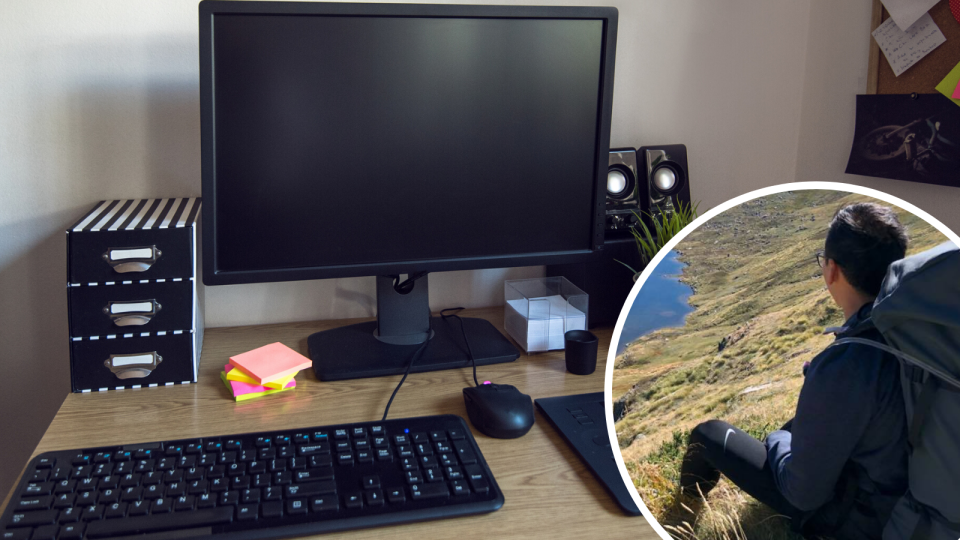I started working from home full-time. Here’s what happened

Working remotely isn’t for everyone. But for many, making the switch to remote work can be like a duck taking to water.
Working from home gives you the option to be productive in your pyjamas, sleep until 8:55am and hop into bed for a quick nap during lunch.
Four months ago, Sydney-based financial risk analyst Boris* was presented with two options when his office relocated further away: continue coming into the office every day, or work from home. He didn’t have to think long about his decision.
Related story: How this Aussie expat travels across Europe and still earns $15,000 a month
Related story: How this Australian mother made $201,000 without a full-time job
Related story: ‘It’s a gamble’: Why this couple are risking half a million dollars to pursue their passion
“For me it was about travel time. It takes me about an hour now,” he told Yahoo Finance. The morning commute from the old office only took 15 to 20 minutes.
“The relocation increased my travel time about three or four times. And that’s just one way,” he said. “Of course I’m going to work from home.”
Little stressors – such as checking train times or being late for work due to issues in Sydney’s public transport system – disappeared overnight.
“I can be a lot more flexible. I can run errands during the day, go get a hair cut, get my car checked, or make a dental appointment,” he said.
“It just gives me more time.”
The upsides
For Boris, the flexibility and comfort of working from home means greater wellbeing, better work-life balance, and even higher productivity.
“I don’t need to sacrifice my social life or any events outside of work, because I don’t need to factor in so much travel time or get up really early for work. So it improves my work-life balance in that sense,” he said.
Cutting out the commute to and from work also meant saving more than just time: Boris estimates he now saves about $60 a week by doing away with the return trip to the western Sydney office and eating at home instead of buying lunch once a week ($20).
He also estimates he’s saved money by not needing to buy as many work clothes.
Zero commute time has made Boris more productive, and he finds he’s more willing to ‘hang back’ get work done without the idea of the peak hour commute hanging over his head.
“Because I don’t have that travel time anymore I’m a bit more inclined to finish things off. If I see I’ve almost finished my report, I may as well spend another 30 min finishing it, whereas if I had to travel I’d say, ‘no I have to make my train’,” he told Yahoo Finance.
“If I finish 4:30pm in the office, I get home at 6pm. But if I finish at 5 and stay back until 5:30pm, I’m home. I’ve done more work; I’m more productive.”
The downsides
However, for all the charm of remote work, there are definitely aspects of being based in an office that you can’t access by working from home. It took Boris around a fortnight to really get settled into the home-based routine.
“It definitely does get quite lonely, because you’ve got less human interaction. You don’t really have that team bonding or team-building, the chance to get to know your coworkers, those work events, stuff like that,” he said.
“Of course, there is less support.”
Working from home comes with a whole host of new distractions, and you’ll need self-control to manage distractions at home to avoid gravitating towards your bed or TV, said Boris.
Technology also presents challenges.
“I’m working on my laptop with a sh*tty monitor, whereas at work I have three monitors,” he said.
Dialling into meetings has become the bane of his existence: you can no longer depend on the physical and visual cues you used to.
“Sometimes the lines cut out, other people in the room might talk and you can’t hear them, sometimes there are tech issues.”
Tips to transition into remote working
If it’s possible, Boris recommends coming into the office once a week to stay in touch with the team, and timing this with important meetings. “Go into the office so you’re with your team,” he said.
“I try to be in the office when we have a training session just because it’s easier for me to learn. You get real-time feedback, you don’t have those delays over the phone or Skype.
“It’s also good to make an appearance, so people don’t forget you, especially managers.”
To combat distraction, Boris recommends demarcating an area of the house that’s specifically for work.
If that doesn’t work, try changing into different clothes during business hours and out of them when work is done for the day.
For those who feel unsure about trying the work-from-home arrangement, Boris says it’s worth a try.
“If you have the opportunity, it’s not for everyone, but you should just give it a go,” he said.
“I think it’s good that workplaces are being more flexible. It just makes everyone’s lives easier... It’s time for themselves and time they can give back to the company, an extra half an hour here and there, because they have that extra time.”
*Name has been changed.
Make your money work with Yahoo Finance’s daily newsletter. Sign up here and stay on top of the latest money, news and tech news.

 Yahoo Finance
Yahoo Finance 
